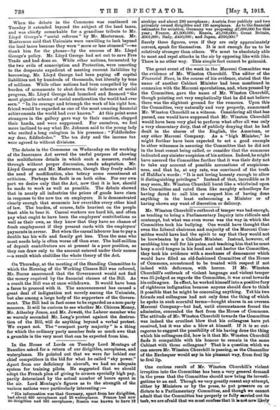The debate in the Commons on Wednesday on the working
of the Insurance Act served the useful purpose of showing the multifarious details in which such a measure, rushed through without proper discussion, needs adaptation. Mr. Lloyd George and Mr. Masterman, though they freely admit the need of modification, also betray some resentment at criticism. Perhaps the fault is on both sides. For our own part we desire only that the Act, now that it is law, should be made to work as well as possible. The debate showed that in nearly all industries the prices of goods have risen in response to the new tax on employers. It is demonstrated clearly enough that economic law overrides every other kind of law. The burden, of course, falls heaviest on the people least able to bear it. Casual workers are bard bit, and often pay what ought to have been the employers' contributions as well as their own, as they know that they have no chance of fresh employment if they present cards with the employers' payments in arrear. But when the casual labourer has to pay a double tax his wife and family get less. Thus the man who most needs help is often worse off than ever. The half-million of deposit contributors are at present in a poor position, as they can draw only to the amount entered under their names —a result which stultifies the whole theory of the Act.


















































 Previous page
Previous page